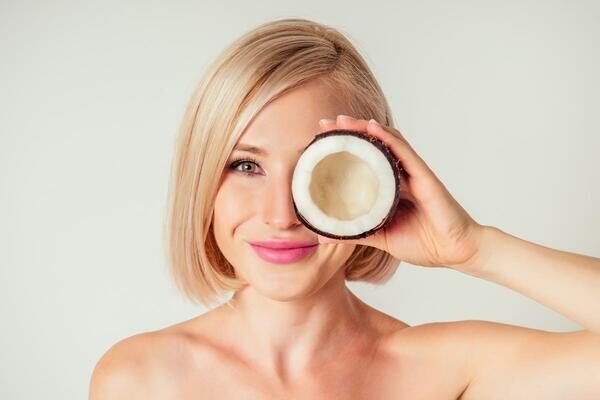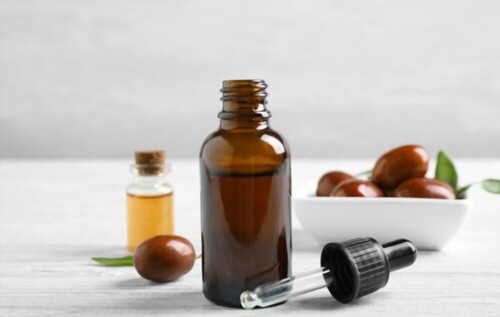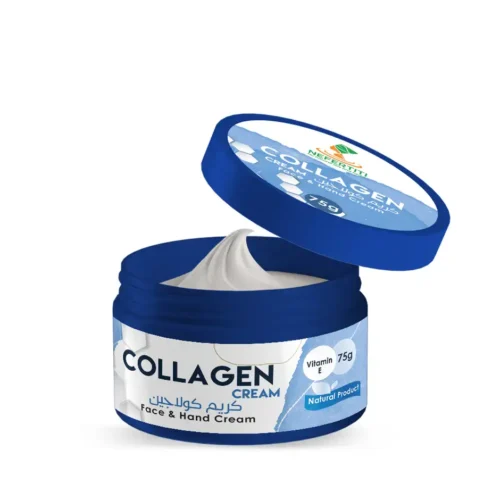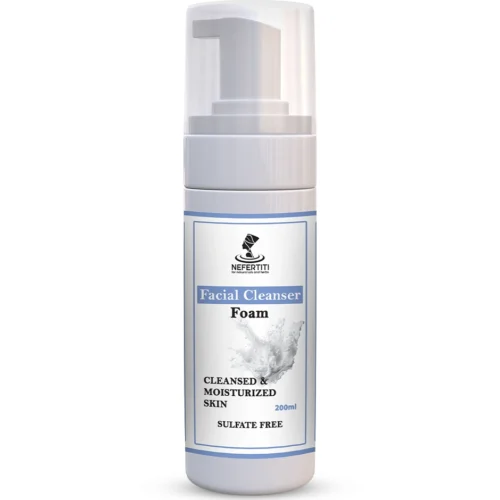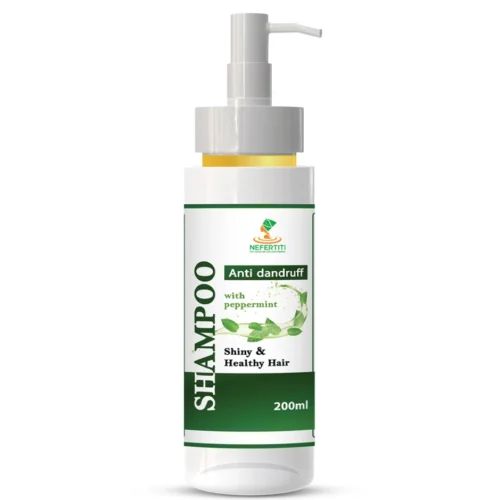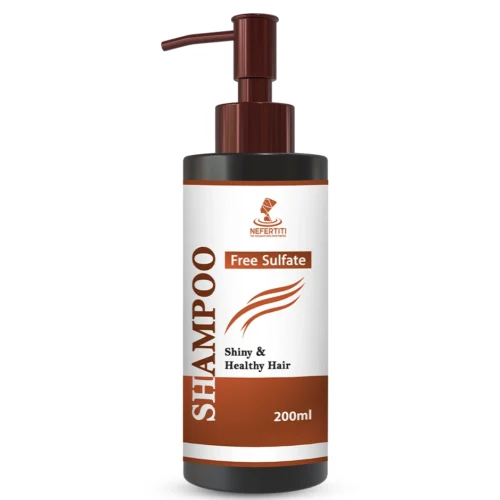Jojoba oil is obtained from the cold-pressing of the seeds of the jojoba plant (Simmondsia chinensis), which is native to Southwestern United States and neighbouring Mexico. The name Jojoba (pronounced ho-ho-ba due to its Spanish origins), comes from the Native American name “Hohowi”. It was originally used to heal and condition the skin and hair by the Native Americans, by way of a salve which they created from the heated seeds.
 Originally harvested commercially as a replacement for Sperm Whale Oil, it proved to be too costly, and is now predominantly used in the cosmetic industry, although it is also used as a natural insecticide and as a natural wax treatment for fruit. Since the 1970’s jojoba oil has been synonymous with hair care, and its popularity in this field has continued to grow and it is a key ingredient in many of today’s hair products. Although called an oil, jojoba oil is technically a wax ester, and is structurally and chemically remarkably similar to the oils (or sebum) found on healthy skin, which is one of the reasons that makes this a wonder oil for all over body care.
Originally harvested commercially as a replacement for Sperm Whale Oil, it proved to be too costly, and is now predominantly used in the cosmetic industry, although it is also used as a natural insecticide and as a natural wax treatment for fruit. Since the 1970’s jojoba oil has been synonymous with hair care, and its popularity in this field has continued to grow and it is a key ingredient in many of today’s hair products. Although called an oil, jojoba oil is technically a wax ester, and is structurally and chemically remarkably similar to the oils (or sebum) found on healthy skin, which is one of the reasons that makes this a wonder oil for all over body care.
For an ingredient to have remained so popular for five decades, it must be something really special right? So let’s look at what jojoba oil can do for your hair, and why incorporating it into your hair-care regime may be one of the best decisions you’ll ever make for your hair.
Properties of Jojoba Oil
Analgesic, anti-acne, anti-ageing, anti-inflammatory, anti-psoriasis, antibacterial, antifungal, antimicrobial, antioxidant, antiviral. Lubricant, non-allergenic, non-comedogenic, non-toxic, skin emollient, wound healing
Constituents of Jojoba Oil
Main : Erucic acid & oleic acid Other : Gadoleic Acid (Eicosenoic Acid), Palmitic Acid, Palmitoleic Acid, Stearic Acid, Behenic Acid, Vitamin E, A, D, and B Complex, chromium, copper, and zinc.
- Jojoba oil locks in moisture
 As a natural moisturiser and emollient, jojoba oil is perfect for treating and preventing dryness. By mimicking sebum it is able to balance moisture levels. As a lightweight oil it is not able to penetrate the hair but instead acts as a sealant to prevent water loss, and can lock in moisture such as after a shower. To deeply moisturise the hair, it is perfect to mix with a heavier oil such as coconut which will penetrate the hair, and be left on overnight.
As a natural moisturiser and emollient, jojoba oil is perfect for treating and preventing dryness. By mimicking sebum it is able to balance moisture levels. As a lightweight oil it is not able to penetrate the hair but instead acts as a sealant to prevent water loss, and can lock in moisture such as after a shower. To deeply moisturise the hair, it is perfect to mix with a heavier oil such as coconut which will penetrate the hair, and be left on overnight.
- Jojoba oil balances the scalp
Having oily scalp and dry ends can be a nightmare. But an oily scalp can also be caused by the scalp drying out due to overwashing or hot weather, causing the sebaceous glands to over react and produce too much sebum. Since jojoba oil is so similar to sebum, it is easily absorbed by the scalp, and will trick the scalp into thinking that the scalp is adequately hydrated and thus it will not produce any further sebum, thus helping to balance the scalp. Jojoba oil will also help to restore the natural pH balance. Use only cold or lukewarm water to wash the hair and scalp as hot water stimulates the sebaceous glands.
- Jojoba oil imparts shine
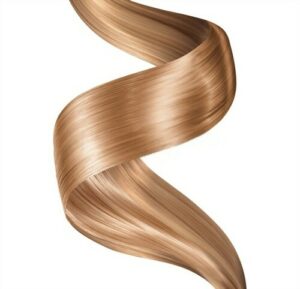 The hair is made up of three layers. In healthy hair the outer layer, the cuticle, retains its natural oils and protects the inner layers, also reflecting light and making the hair shine. If the outer layer doesn’t retain enough moisture, due to sun or wind exposure, living in a hot and humid country, too much hot styling, using harsh hair care products, frequently swimming in chlorinated or salty water, or even washing your hair too often, the oil breaks down and the hair appears dull and unhealthy. Ageing and hormonal changes during pregnancy and menopause can also dry the hair. Since jojoba oil coats the hair strands, it will naturally reflect the light and offer a great amount of shine.
The hair is made up of three layers. In healthy hair the outer layer, the cuticle, retains its natural oils and protects the inner layers, also reflecting light and making the hair shine. If the outer layer doesn’t retain enough moisture, due to sun or wind exposure, living in a hot and humid country, too much hot styling, using harsh hair care products, frequently swimming in chlorinated or salty water, or even washing your hair too often, the oil breaks down and the hair appears dull and unhealthy. Ageing and hormonal changes during pregnancy and menopause can also dry the hair. Since jojoba oil coats the hair strands, it will naturally reflect the light and offer a great amount of shine.
- Jojoba oil nourishes, repairs damage and reduces frizz
Over-brushing hair, excessive chemical treatments, harsh hair products, too much heat, and lack of conditioning can cause damage to the hair, including split ends, which can extend further up the hair and lead to breakage, brittleness a lack of elasticity, and looks dead and possibly frizzy. White nodules may even be visible at the end of the strands. Basically the cuticle has lifted and the overlapping cells are unable to lay flat which causes these problems and makes the hair extremely fragile.
Although it is not possible to repair split ends, what jojoba oil can do is nourish the hair, fill the gaps in the cuticle and “glue” it together, thus preventing further damage. It can also help to nourish those hard to reach areas, particularly for curly textured hair.
- Jojoba oil protects the hair
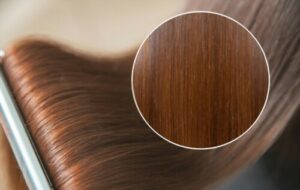 With the protective coat which jojoba oil surrounds each strand with, it will protect against heat and styling damage, chemical damage, and environmental damage. Apply a few drops to the palms of your hair and lightly stroke over damp hair before using a hairdryer or straighteners.
With the protective coat which jojoba oil surrounds each strand with, it will protect against heat and styling damage, chemical damage, and environmental damage. Apply a few drops to the palms of your hair and lightly stroke over damp hair before using a hairdryer or straighteners.
- Jojoba oil offer total scalp care
With significant antibacterial, antifungal and anti-inflammatory properties, along with its ability to balance the scalp by mimicking sebum (adding moisture where needed and preventing over production of sebum to counteract oiliness), jojoba oil is an able to remedy most scalp issues, including dandruff, dry flaky scalp, infections and breakouts. It is also known to soothe the pain and irritation caused by psoriasis and eczema, and to remedy itching. Overall, jojoba is a great scalp cleanser, and can prevent blocked follicles which could otherwise lead to hair loss.
- Jojoba oil for hair growth
 With its high concentration of vitamins B & E, as well as zinc and copper, jojoba oil can aid growth as well as making the hair look thicker and healthier. Used in conjunction with an effective aromatherapy oil such as lavender, it can positively stimulate growth as indicated in studies. Massaging the scalp with jojoba oil, in addition to alleviating scalp issues and offering relaxation, also increases blood circulation which promotes growth.
With its high concentration of vitamins B & E, as well as zinc and copper, jojoba oil can aid growth as well as making the hair look thicker and healthier. Used in conjunction with an effective aromatherapy oil such as lavender, it can positively stimulate growth as indicated in studies. Massaging the scalp with jojoba oil, in addition to alleviating scalp issues and offering relaxation, also increases blood circulation which promotes growth.
- Jojoba oil deters premature greying
External environmental factors such as pollution can lead to premature greying of the hair. As already mentioned, jojoba is a great antioxidant and can help to protect against external influences. It is also rich in vitamins and minerals including copper, and greying hair has been linked with a zinc deficiency.
What Ways Can Jojoba Be Incorporated Into My Haircare Routine?
There are are several ways in which you can effectively use jojoba oil for your hair.
- Apply directly
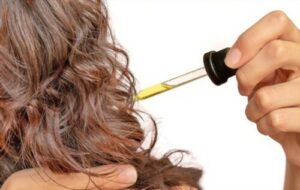 Pre-shampoo treatment: Massage a coin-sized amount of oil into the scalp and hair of damp hair. Use a wide toothed comb to ensure that all strands are covered and leave on for a minimum of ten minutes. Shampoo off. Recommended twice a week treatment.
Pre-shampoo treatment: Massage a coin-sized amount of oil into the scalp and hair of damp hair. Use a wide toothed comb to ensure that all strands are covered and leave on for a minimum of ten minutes. Shampoo off. Recommended twice a week treatment.
To control flyaway hair, or control frizz or split ends: massage a few drops into the palms of your hands and sweep over the hair.
To address split ends between washes: apply a small amount to the affected hair.
Heat protection: apply a few drops into the palm of your hand and sweep over damp hair.
Tackle frizz or flyaways: add some oil to a spray bottle filled with water and spritz the hair as required.
Scalp massage: Massage into the scalp to enhance relaxation, remedy scalp issues and promote hair growth.
Remember! Always start with a pea sized amount, you can add a little more if needed, but you can’t take it away once applied! Practice will make perfect as you start to understand exactly what your hair needs.
- Add to products
You can also add a few drops of jojoba oil to your daily hair products to enhance their effect and add extra nourishment.
How Often Should I Use Jojoba In My Hair?
Whatever your hair type, including a pre-wash or overnight treatment will be beneficial for your hair, leaving it silky, nourished, protected and healthy.
This Autumn, treat your hair to the natural goodness of jojoba oil. It’s perfect to help your hair recover from the ravages of summer, and to provide protection from the rigours of winter yet to come.


